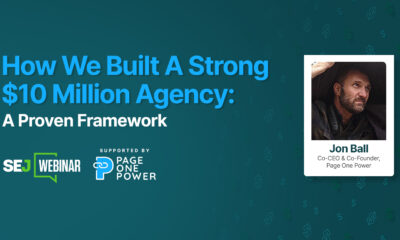SEO
What To Expect Of Your Agency

Effective location-based SEO (local SEO) can have a substantial impact on your digital marketing success comparable to any other core marketing.
For a business that has a physical location, or many company premises to optimize for, the value of dominating your local online space cannot be overstated.
The same can be said for companies functioning and servicing within specific geographic areas that are core for company revenue and related success parameters.
There are many misconceptions about local SEO; for example, local SEO is only for small businesses, or that local SEO restricts total visibility online.
It’s important that, when looking to outsource your local SEO, you ensure your expectations of an agency and the deliverables you receive match your local SEO aspirations.
I hope this column will help.
SEO Agency Fundamentals
Whether it is local SEO deliverables or enterprise-level SEO services, any established and effective search marketing agency will provide the fundamentals expected as specialists in their field.
Typically, this would include:
- A clear set of objectives unique to your immediate, medium, and longer-term requirements.
- An action plan that reinforces what the priorities are and when key milestones will occur.
- Access to data and the building of a larger data ecosystem for insights and action-taking.
- Agreed and consistent ways to communicate, report on progress, and reinforce what is being delivered for your investment.
- Iterative improvement from the ongoing application of expertise and evidence-led decision-making.
- Direct access to key staff working with you to achieve your local SEO goals.
- Simplified and relevant ongoing support and feedback to enable agility and pivoting of approach to maximize new opportunity and react to changing threats.
- Proactive and effective customer care enabling collaborative working, or full outsourcing dependent upon client requirements.
There will be other priorities that may be unique to business circumstances and areas of increased perceived value to your current requirements, and these can be added to the above agency fundamental expectations where applicable.
As a tip, one thing to avoid in your expectations is a small set of very specific and localized SEO keywords to focus on.
These will be the five or ten you may look at on your mobile phone every week and curse the competitor who ranks there.
Whilst you may have some keywords more commercially important than others, please do not restrict your focus (and that of any agency you decide to work with) to solely focus on a handful of terms.
Consider the end goal of these terms and what you wish to achieve through local SEO success.
There may be thousands of relevant and highly effective search queries, plus many new and unique ones being discovered every day in your data.
You don’t want to lose sight of these and their potential value by having a blinkered focus on just a few.
If it’s easier to move away from standalone keyword goals, consider the topic rather than the term. This can be far more useful to measure local SEO gains.
Strong Technical Performance
Regardless of your local SEO goals and objectives, every local SEO campaign should factor in the website’s health, user experience, and overall technical ability to perform.
Traditionally within local SEO, this would focus on topics such as:
Add to the above a practical emphasis on:
You may want to factor in broader items historically associated more with bigger entities and brands, as well.
This could include providing easy access to information through the site architecture, and digital simplification to enable the user to get to their endpoint as easily and effectively as possible (including broader conversation rate optimization principles).
Evidence-Driven Content
It is not enough to provide expert industry opinion and localized content on a website with the expectation to dominate local SEO.
Any competitive local SEO campaigns should ideally be fueled with data (evidence backed) content at levels of quality and volume much higher than you may expect for local-orientated SEO campaigns.
The creation of content may be delivered by you in-house or outsourced to a marketing agency. But regardless of the approach to output, the dovetailing of data, local SEO experts, and leveraging of your unique industry insights is paramount.
It is this combined approach that will provide a competitive advantage, and enable you to consistently create the best of breed content, that has true standalone value both within the local niche and for broader brand and authority building.
From an agency, you should expect them to lead the local SEO content strategy and approach, providing ongoing recommendations using all available and relevant data sets to justify the; priority, focus, purpose, and ongoing impact of content being generated.
You would expect content to be created to leverage the value and metric success of existing content you have on your website.
You would also expect a consistent focus on new opportunities to ideate and implement new content reflecting the new data sets, and changing needs of your core business audience.
As with any comprehensive content strategy led by SEO, you would want to cover a range of user intent, focus on the actual value provided, and look throughout the spectrum of the information seeking and buying cycle.
Whilst this would be skewed towards local SEO, that does not restrict the impact.
Pertinent topic areas important to the business will likely have wider appeal and opportunity to grow site trust, backlinks, and perceived relevancy beyond the local demographic.
Local Authority And Trust Building
Local authority building is a mainstay within local SEO and a necessity for gaining ground within your online niche.
There are a number of consistent threads to this including:
- Local brand building with PR and local media publications.
- Business entity and relevant local and regional directory sites.
- Links and mentions of the brand, company, and key staff in community and business forums.
- Supporting local events, and sharing of expertise (and often resource, charity support, etc.).
- Content promotion and placement (both local content and topical business products/services content).
Outside of the citation and link aspect of authority building is the deeper expertise, authority, and wider trust signal gains.
This includes in no small part the management, optimization, and ongoing growth of reviews and engagement through Google Business Profiles (for every business location), formerly Google My Business.
This includes (but is not limited to) search and maps optimization, profile completeness, promotion of content, and answering questions from your audience.
The more proactive you are with generating positive reviews as part of your combined business and agency focus (including targeted location-specific reviews), the faster you will see gains in your perceived online authority and local SEO results.
This needs to be through Google Business Profiles, Bing Places, and other established and trusted third-party review sites.
Content And Social Media
You need to look at how you and your agency can enable your website and brand to become truly embedded within the local community.
For some sites and brands, this may be many local communities, spanning a number of geographically dispersed regions, whilst for others, it may be a single location and a number of miles surrounding it.
Either way, the ability to enhance your website community focus through audience-aware content hubs, free community resources, and tools, and ideally local user-generated content, the better.
This will naturally tie into social media interaction, engagement, and promotion, as well as social listening and audience building, by a genuine understanding of their wants, needs, plus pain points.
And more importantly how your people/experts/staff, brand, and products/services can positively impact them.
In Summary
Businesses will have an array of bespoke requirements for their local SEO and the deliverables expected from an agency.
Some of these will be based on filters applied tied to previous experiences, and often lessons learned.
There are, however, a number of key standard expectations which you should always consider, as outlined above.
More resources:
Featured Image: Vector_Bird/Shutterstock
SEO
Google Declares It The “Gemini Era” As Revenue Grows 15%

Alphabet Inc., Google’s parent company, announced its first quarter 2024 financial results today.
While Google reported double-digit growth in key revenue areas, the focus was on its AI developments, dubbed the “Gemini era” by CEO Sundar Pichai.
The Numbers: 15% Revenue Growth, Operating Margins Expand
Alphabet reported Q1 revenues of $80.5 billion, a 15% increase year-over-year, exceeding Wall Street’s projections.
Net income was $23.7 billion, with diluted earnings per share of $1.89. Operating margins expanded to 32%, up from 25% in the prior year.
Ruth Porat, Alphabet’s President and CFO, stated:
“Our strong financial results reflect revenue strength across the company and ongoing efforts to durably reengineer our cost base.”
Google’s core advertising units, such as Search and YouTube, drove growth. Google advertising revenues hit $61.7 billion for the quarter.
The Cloud division also maintained momentum, with revenues of $9.6 billion, up 28% year-over-year.
Pichai highlighted that YouTube and Cloud are expected to exit 2024 at a combined $100 billion annual revenue run rate.
Generative AI Integration in Search
Google experimented with AI-powered features in Search Labs before recently introducing AI overviews into the main search results page.
Regarding the gradual rollout, Pichai states:
“We are being measured in how we do this, focusing on areas where gen AI can improve the Search experience, while also prioritizing traffic to websites and merchants.”
Pichai reports that Google’s generative AI features have answered over a billion queries already:
“We’ve already served billions of queries with our generative AI features. It’s enabling people to access new information, to ask questions in new ways, and to ask more complex questions.”
Google reports increased Search usage and user satisfaction among those interacting with the new AI overview results.
The company also highlighted its “Circle to Search” feature on Android, which allows users to circle objects on their screen or in videos to get instant AI-powered answers via Google Lens.
Reorganizing For The “Gemini Era”
As part of the AI roadmap, Alphabet is consolidating all teams building AI models under the Google DeepMind umbrella.
Pichai revealed that, through hardware and software improvements, the company has reduced machine costs associated with its generative AI search results by 80% over the past year.
He states:
“Our data centers are some of the most high-performing, secure, reliable and efficient in the world. We’ve developed new AI models and algorithms that are more than one hundred times more efficient than they were 18 months ago.
How Will Google Make Money With AI?
Alphabet sees opportunities to monetize AI through its advertising products, Cloud offerings, and subscription services.
Google is integrating Gemini into ad products like Performance Max. The company’s Cloud division is bringing “the best of Google AI” to enterprise customers worldwide.
Google One, the company’s subscription service, surpassed 100 million paid subscribers in Q1 and introduced a new premium plan featuring advanced generative AI capabilities powered by Gemini models.
Future Outlook
Pichai outlined six key advantages positioning Alphabet to lead the “next wave of AI innovation”:
- Research leadership in AI breakthroughs like the multimodal Gemini model
- Robust AI infrastructure and custom TPU chips
- Integrating generative AI into Search to enhance the user experience
- A global product footprint reaching billions
- Streamlined teams and improved execution velocity
- Multiple revenue streams to monetize AI through advertising and cloud
With upcoming events like Google I/O and Google Marketing Live, the company is expected to share further updates on its AI initiatives and product roadmap.
Featured Image: Sergei Elagin/Shutterstock
SEO
brightonSEO Live Blog

Hello everyone. It’s April again, so I’m back in Brighton for another two days of Being the introvert I am, my idea of fun isn’t hanging around our booth all day explaining we’ve run out of t-shirts (seriously, you need to be fast if you want swag!). So I decided to do something useful and live-blog the event instead.
Follow below for talk takeaways and (very) mildly humorous commentary. sun, sea, and SEO!
SEO
Google Further Postpones Third-Party Cookie Deprecation In Chrome

Google has again delayed its plan to phase out third-party cookies in the Chrome web browser. The latest postponement comes after ongoing challenges in reconciling feedback from industry stakeholders and regulators.
The announcement was made in Google and the UK’s Competition and Markets Authority (CMA) joint quarterly report on the Privacy Sandbox initiative, scheduled for release on April 26.
Chrome’s Third-Party Cookie Phaseout Pushed To 2025
Google states it “will not complete third-party cookie deprecation during the second half of Q4” this year as planned.
Instead, the tech giant aims to begin deprecating third-party cookies in Chrome “starting early next year,” assuming an agreement can be reached with the CMA and the UK’s Information Commissioner’s Office (ICO).
The statement reads:
“We recognize that there are ongoing challenges related to reconciling divergent feedback from the industry, regulators and developers, and will continue to engage closely with the entire ecosystem. It’s also critical that the CMA has sufficient time to review all evidence, including results from industry tests, which the CMA has asked market participants to provide by the end of June.”
Continued Engagement With Regulators
Google reiterated its commitment to “engaging closely with the CMA and ICO” throughout the process and hopes to conclude discussions this year.
This marks the third delay to Google’s plan to deprecate third-party cookies, initially aiming for a Q3 2023 phaseout before pushing it back to late 2024.
The postponements reflect the challenges in transitioning away from cross-site user tracking while balancing privacy and advertiser interests.
Transition Period & Impact
In January, Chrome began restricting third-party cookie access for 1% of users globally. This percentage was expected to gradually increase until 100% of users were covered by Q3 2024.
However, the latest delay gives websites and services more time to migrate away from third-party cookie dependencies through Google’s limited “deprecation trials” program.
The trials offer temporary cookie access extensions until December 27, 2024, for non-advertising use cases that can demonstrate direct user impact and functional breakage.
While easing the transition, the trials have strict eligibility rules. Advertising-related services are ineligible, and origins matching known ad-related domains are rejected.
Google states the program aims to address functional issues rather than relieve general data collection inconveniences.
Publisher & Advertiser Implications
The repeated delays highlight the potential disruption for digital publishers and advertisers relying on third-party cookie tracking.
Industry groups have raised concerns that restricting cross-site tracking could push websites toward more opaque privacy-invasive practices.
However, privacy advocates view the phaseout as crucial in preventing covert user profiling across the web.
With the latest postponement, all parties have more time to prepare for the eventual loss of third-party cookies and adopt Google’s proposed Privacy Sandbox APIs as replacements.
Featured Image: Novikov Aleksey/Shutterstock
-

 PPC7 days ago
PPC7 days ago19 Best SEO Tools in 2024 (For Every Use Case)
-
SEARCHENGINES6 days ago
Daily Search Forum Recap: April 19, 2024
-

 WORDPRESS7 days ago
WORDPRESS7 days agoHow to Make $5000 of Passive Income Every Month in WordPress
-

 WORDPRESS5 days ago
WORDPRESS5 days ago13 Best HubSpot Alternatives for 2024 (Free + Paid)
-

 MARKETING6 days ago
MARKETING6 days agoBattling for Attention in the 2024 Election Year Media Frenzy
-

 SEO7 days ago
SEO7 days ago25 WordPress Alternatives Best For SEO
-

 WORDPRESS6 days ago
WORDPRESS6 days ago7 Best WooCommerce Points and Rewards Plugins (Free & Paid)
-

 AFFILIATE MARKETING7 days ago
AFFILIATE MARKETING7 days agoAI Will Transform the Workplace. Here’s How HR Can Prepare for It.
















You must be logged in to post a comment Login